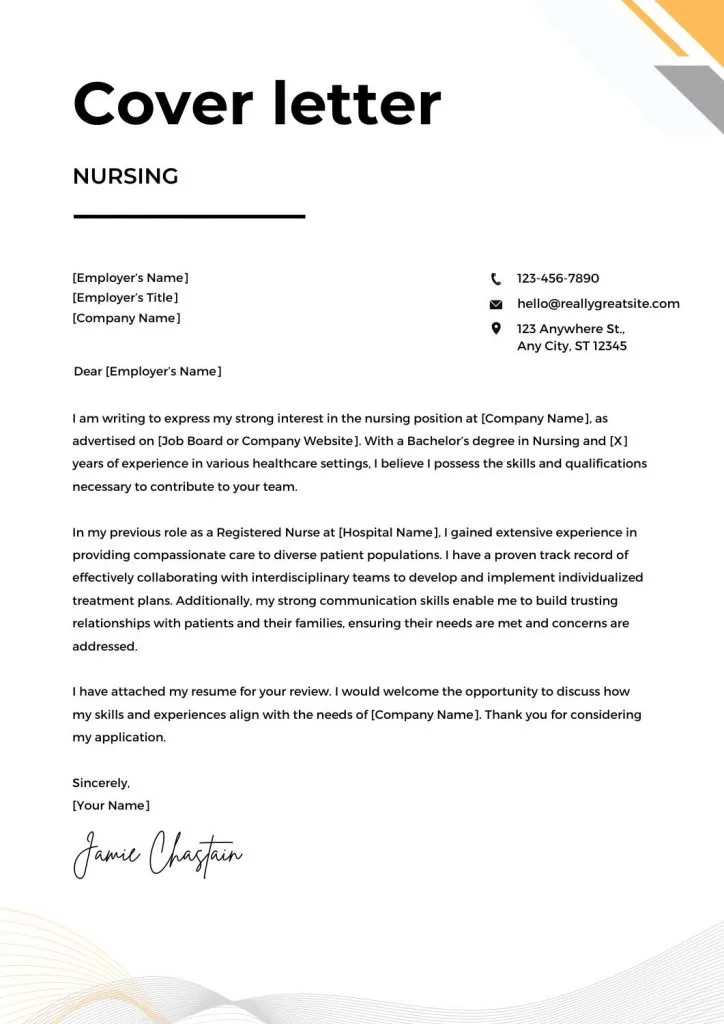What is a Nursing Cover Letter
A nursing cover letter is a crucial document accompanying your nursing resume when applying for a job. It serves as a personalized introduction, allowing you to showcase your qualifications, experience, and enthusiasm for the specific nursing position. Unlike a resume, which provides a factual overview of your career, a cover letter enables you to tell your story, highlighting why you are the perfect fit for the role and the healthcare organization. It’s your opportunity to make a strong first impression and convince the hiring manager to review your resume and consider you for an interview. A well-crafted nursing cover letter can significantly increase your chances of landing your dream job in the competitive healthcare field.
Purpose of a Nursing Cover Letter
The primary purpose of a nursing cover letter is to persuade the hiring manager that you are the ideal candidate for the position. It goes beyond simply listing your skills and experiences, instead, it demonstrates how your qualifications align with the specific needs of the role and the values of the healthcare facility. The cover letter allows you to explain your career goals, express your passion for nursing, and illustrate how you can contribute to the organization’s mission. A well-written cover letter can set you apart from other applicants and showcase your personality and communication skills, both of which are essential in the nursing profession.
Key Components of a Nursing Cover Letter
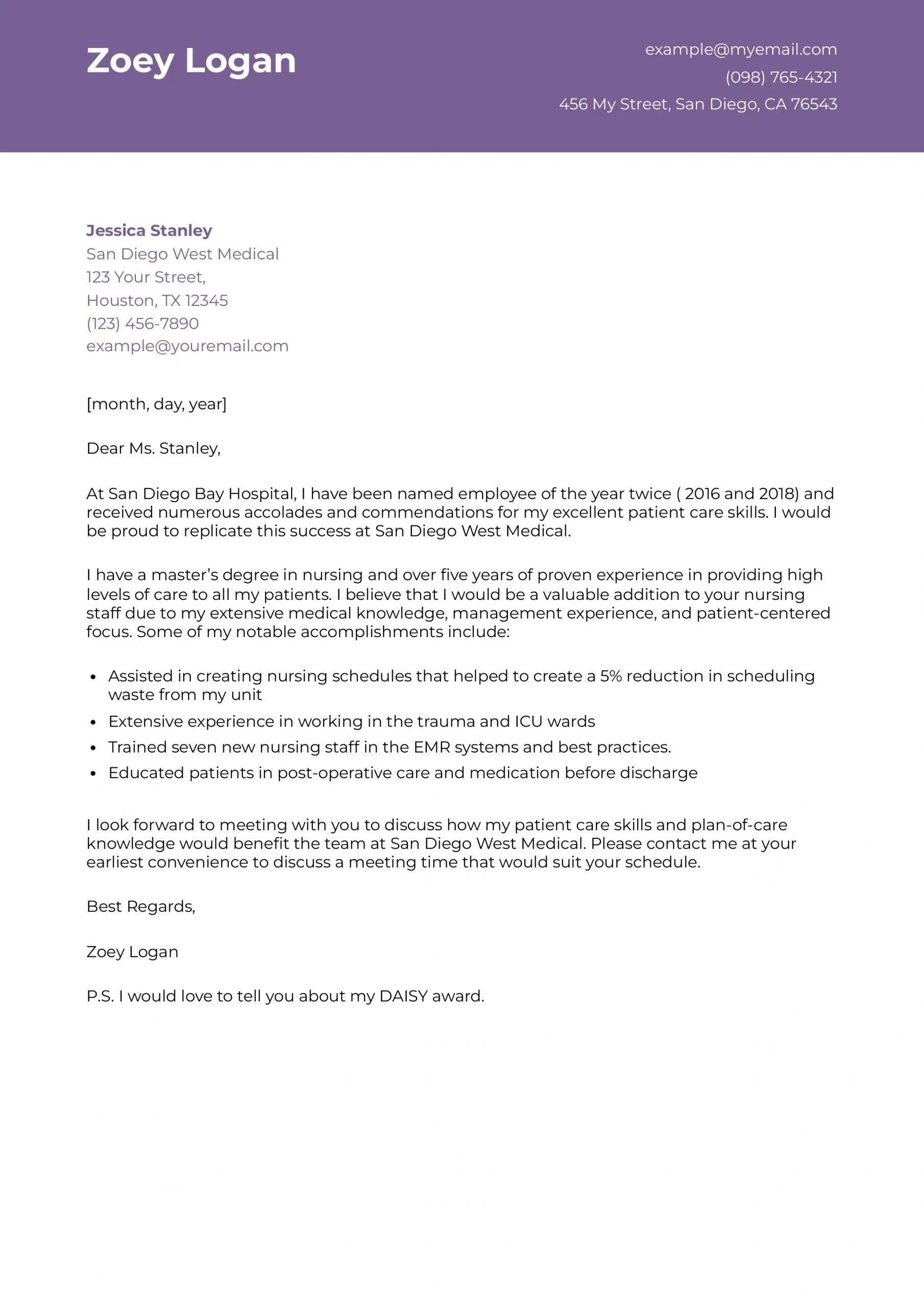
A compelling nursing cover letter comprises several key components that work together to present a strong case for your candidacy. Each section serves a specific purpose, contributing to the overall effectiveness of your application. From your contact information to your closing statement, every element should be carefully crafted to leave a lasting positive impression on the hiring manager. Paying close attention to these details will increase your chances of getting noticed and moving forward in the application process.
Contact Information
At the top of your cover letter, include your full name, current address, phone number, and professional email address. Ensure that the information is accurate and up-to-date. Use a professional-sounding email address; avoid nicknames or casual language. This section allows the hiring manager to easily contact you if they wish to schedule an interview or request further information. Accuracy in this area is critical to ensure you do not miss out on any important communications from the potential employer.
Greeting and Opening
Address the hiring manager by name, if possible. Research the hiring manager’s name and title through the company website or LinkedIn. If you cannot find a specific name, use a professional salutation like “Dear Hiring Manager.” The opening paragraph should grab the reader’s attention. State the position you are applying for and briefly mention where you saw the job posting. Then, immediately highlight your key skills and the value you can bring to the organization. Make it clear why you are interested in the position and the specific healthcare facility. Make the opening section both concise and engaging.
Body Paragraphs
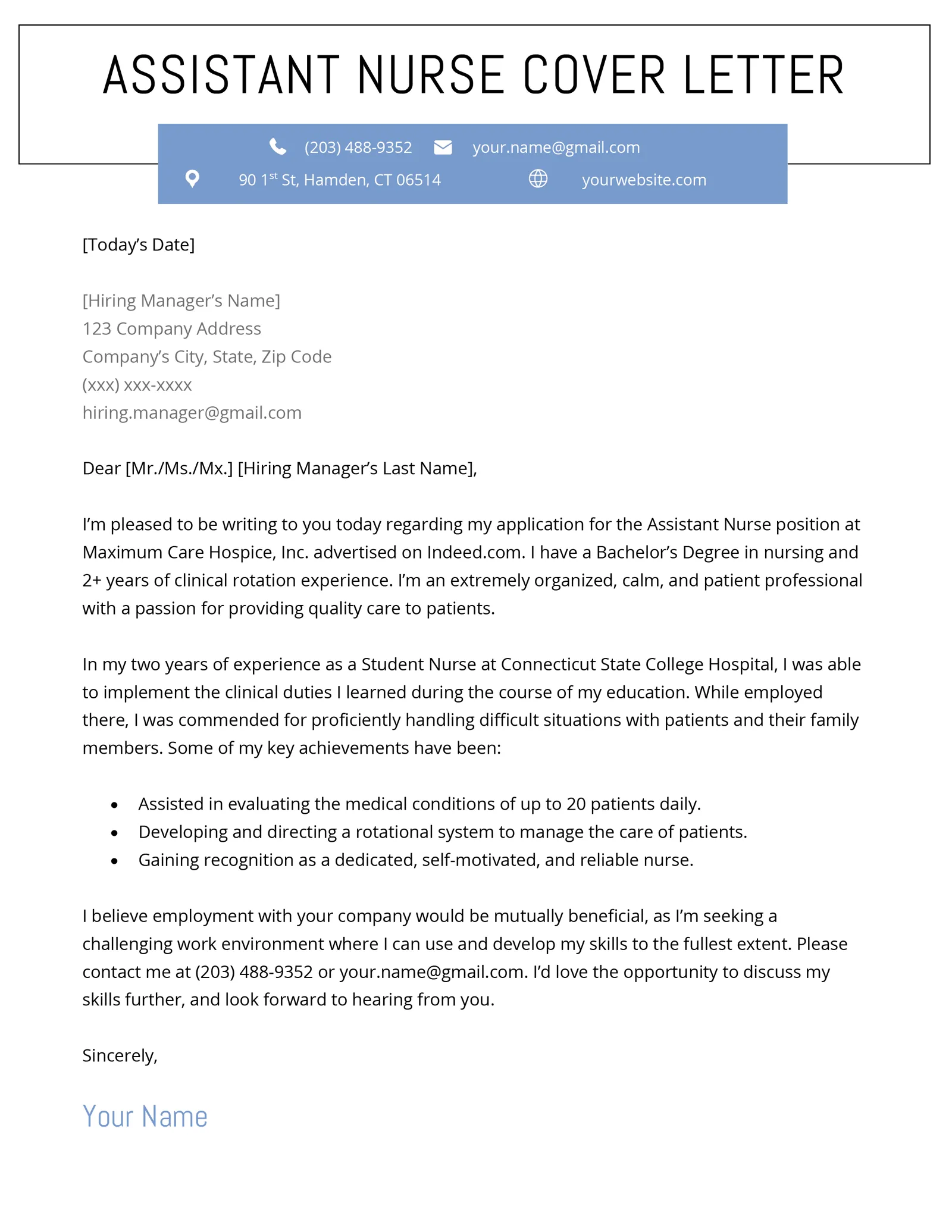
The body paragraphs form the core of your cover letter. They allow you to delve deeper into your qualifications, experience, and passion for nursing. Use these sections to showcase how your skills align with the job requirements. Provide specific examples of your accomplishments and demonstrate the value you would bring to the role. Be sure to tailor these paragraphs to the job description, emphasizing the skills and experiences that are most relevant to the position. Keep each paragraph focused, clear, and concise.
Highlighting Skills and Experience
In your body paragraphs, highlight the nursing skills and experiences that match the job requirements. Refer back to the job description and pinpoint the key skills and qualifications sought by the employer. Provide specific examples of how you have utilized these skills in previous roles. For example, if the job description emphasizes patient care, describe your experience in providing compassionate and effective care to patients. Focus on the skills you possess and the experience you have that are most relevant to the position you are applying for, illustrating how you have successfully utilized those skills in past situations.
Quantifying Achievements
Whenever possible, quantify your achievements with numbers and data. Instead of simply stating you “improved patient outcomes,” state, “Improved patient outcomes by 15% through implementation of a new care plan.” Use numbers to demonstrate the impact of your work. This makes your accomplishments more tangible and credible. Quantifying your achievements helps the hiring manager understand the value you brought to your previous roles and the potential value you could bring to their organization. Aim for a strong presentation of your accomplishments.
Expressing Enthusiasm and Fit
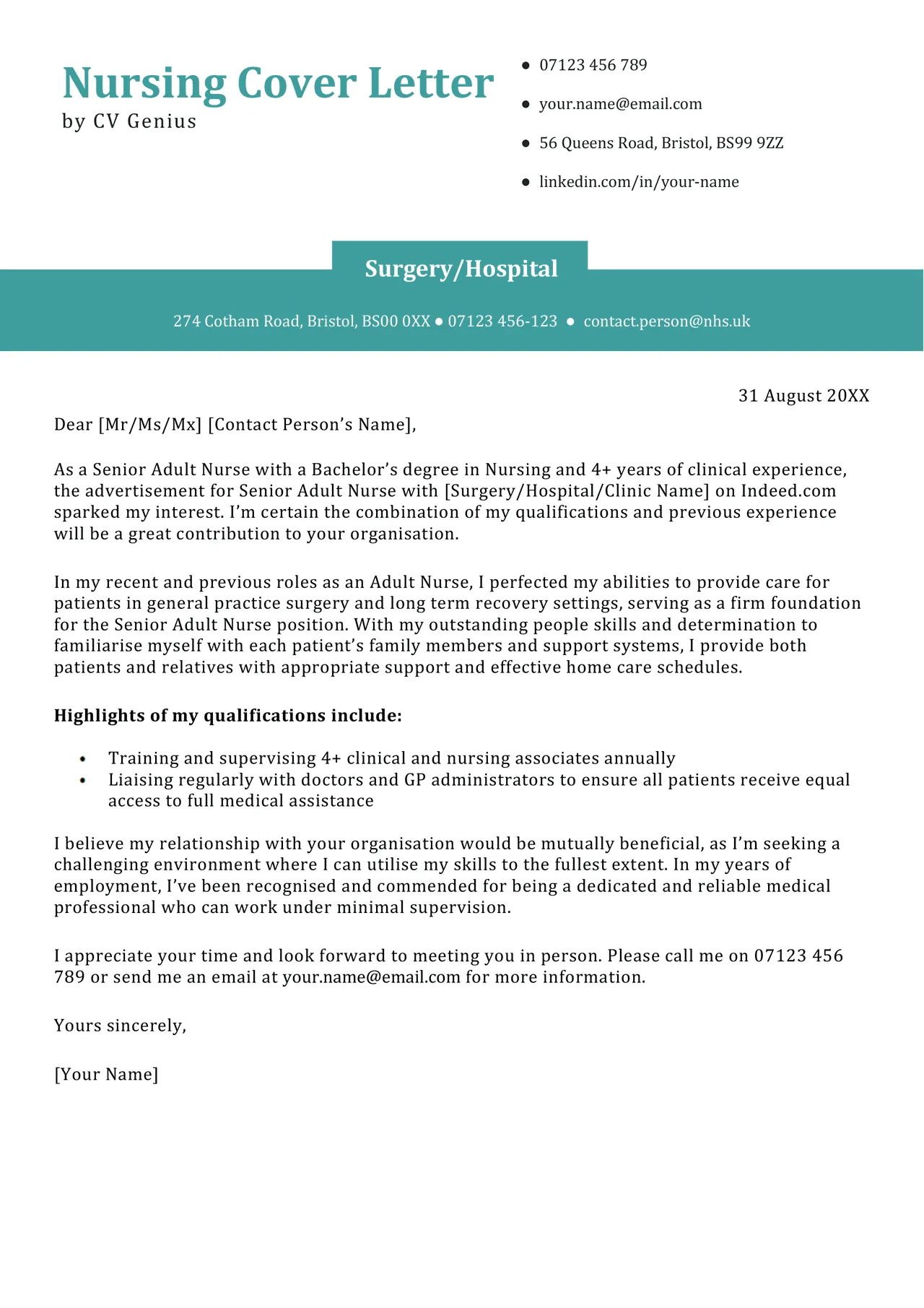
In the body paragraphs, express your enthusiasm for the nursing position and your interest in the healthcare facility. Explain why you are drawn to the specific role and how it aligns with your career goals. Demonstrate your understanding of the facility’s mission and values and explain why you believe you would be a good fit for the team. This helps to show that you are genuinely interested in the position and not just applying for any job. By conveying your interest and passion, you make yourself more memorable to the hiring manager. Show that you have done some research on the hospital or clinic and that you understand what makes them special.
Closing and Call to Action
In the closing paragraph, reiterate your interest in the position and thank the hiring manager for their time and consideration. Include a call to action, such as, “I am eager to discuss my qualifications further in an interview.” Reiterate your contact information, making it easy for the hiring manager to reach you. Close your cover letter professionally with a closing like “Sincerely” or “Best regards.” Make sure to proofread your entire cover letter one last time before sending.
Formatting Your Nursing Cover Letter
The format of your nursing cover letter plays a crucial role in how the hiring manager perceives you. A well-formatted cover letter is easy to read, professional, and visually appealing. It helps to create a positive impression and make your application stand out. Proper formatting also demonstrates attention to detail, an important quality for a nurse. By adhering to standard formatting guidelines, you can create a polished and professional document.
Font and Style
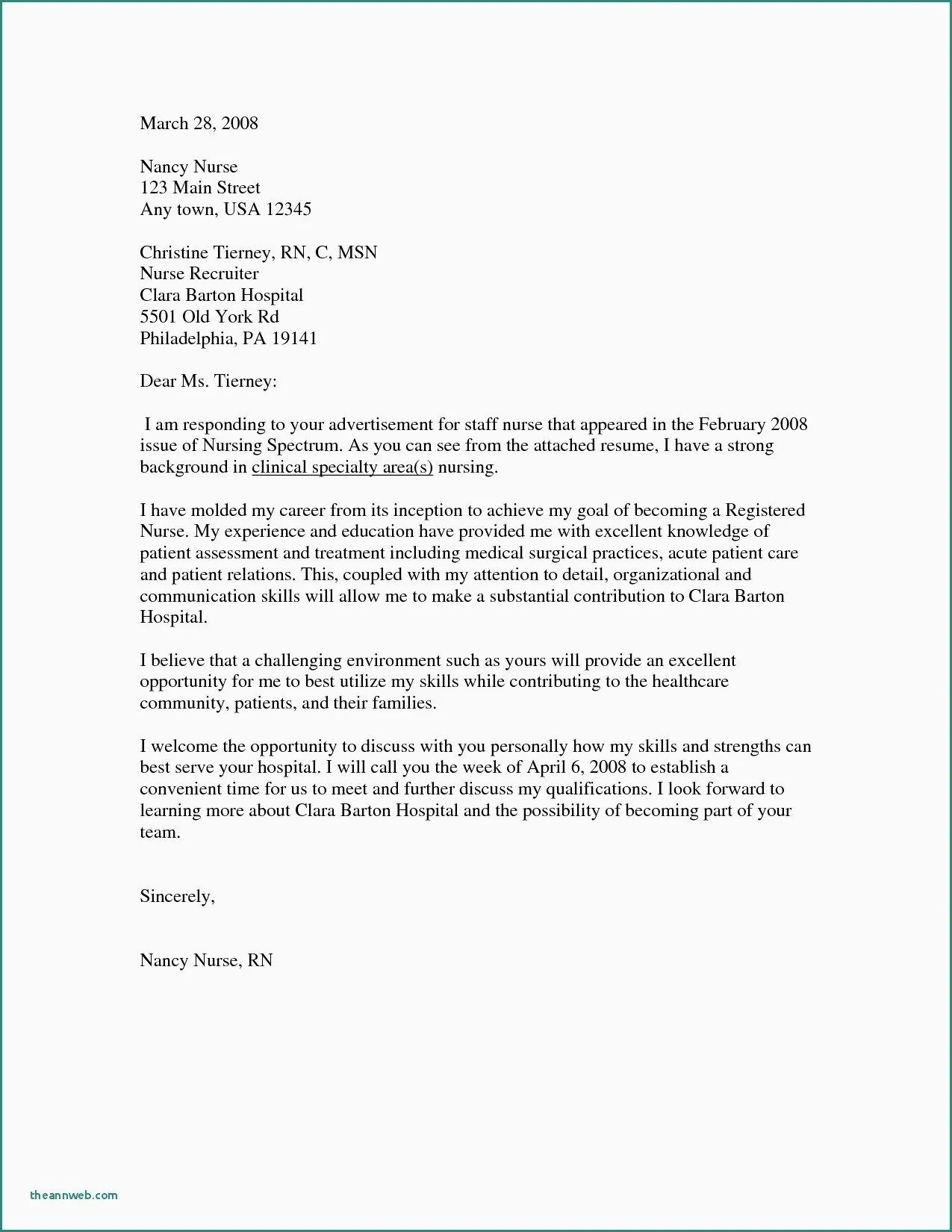
Choose a professional and readable font such as Times New Roman, Arial, or Calibri, with a font size of 11 or 12 points. Use a consistent font throughout the document. Maintain a clean and uncluttered layout, with ample white space between paragraphs and sections. Avoid using overly decorative or distracting fonts. The goal is to create a document that is easy on the eyes. A clean and professional style shows that you care about the details.
Length and Structure
Keep your cover letter concise, ideally no more than one page. Use a clear and logical structure, with distinct sections and paragraphs. Use headings and subheadings to guide the reader through your content. Start with your contact information and the date, followed by the hiring manager’s name and title. Then, include an opening paragraph, body paragraphs, and a closing paragraph. Ensure that each paragraph focuses on a specific point and contributes to your overall message. A well-structured cover letter shows organization and professionalism.
Proofreading and Editing
Thoroughly proofread your cover letter for any typos, grammatical errors, and inconsistencies. Use a grammar checker and spell checker, but don’t rely on them entirely. Read your cover letter aloud to catch any awkward phrasing or unclear sentences. Consider having a friend or family member review it for you as a fresh pair of eyes can often spot errors you might miss. A polished and error-free cover letter demonstrates attention to detail and professionalism, making a positive impression on the hiring manager. Proofreading is a crucial step and should not be overlooked.
Tailoring Your Cover Letter
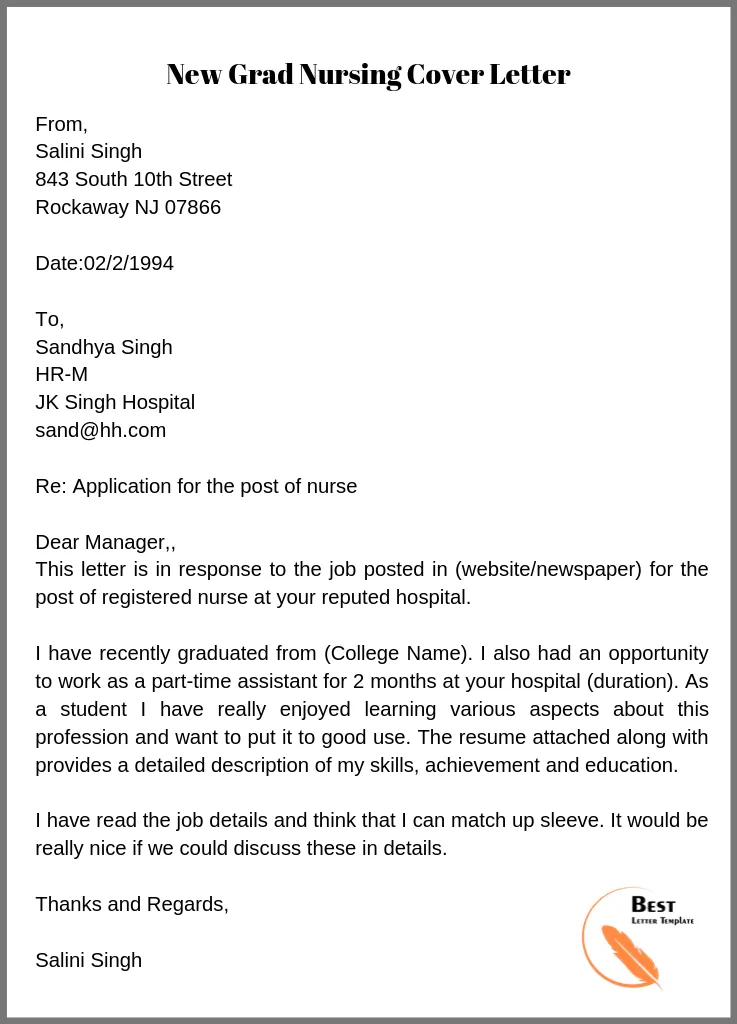
A generic cover letter sent to multiple employers is unlikely to make a significant impact. Tailoring your cover letter to each specific job application is essential for making a strong impression. Customize your letter to showcase your interest in the specific role and demonstrate your understanding of the healthcare facility. This level of personalization sets you apart from other applicants.
Researching the Hospital or Clinic
Before writing your cover letter, research the healthcare facility to understand its mission, values, and recent achievements. Visit the facility’s website, read articles, and check social media to get a better understanding of their culture and the type of care they provide. This information allows you to tailor your cover letter, highlighting how your skills and experiences align with their specific needs and values. Demonstrating your knowledge of the facility will show your genuine interest and your commitment to contributing to their goals. Proper research is an essential part of tailoring your cover letter.
Using Keywords from the Job Description
Carefully review the job description and identify the keywords used to describe the required skills, experience, and qualifications. Incorporate these keywords naturally throughout your cover letter. This not only helps your cover letter pass through applicant tracking systems (ATS) but also shows the hiring manager that you understand the role’s requirements. However, avoid keyword stuffing; use the keywords in context, and ensure that your letter flows naturally and remains easy to read. The key is to match your skills to the job description keywords.
Examples of Strong Nursing Cover Letters
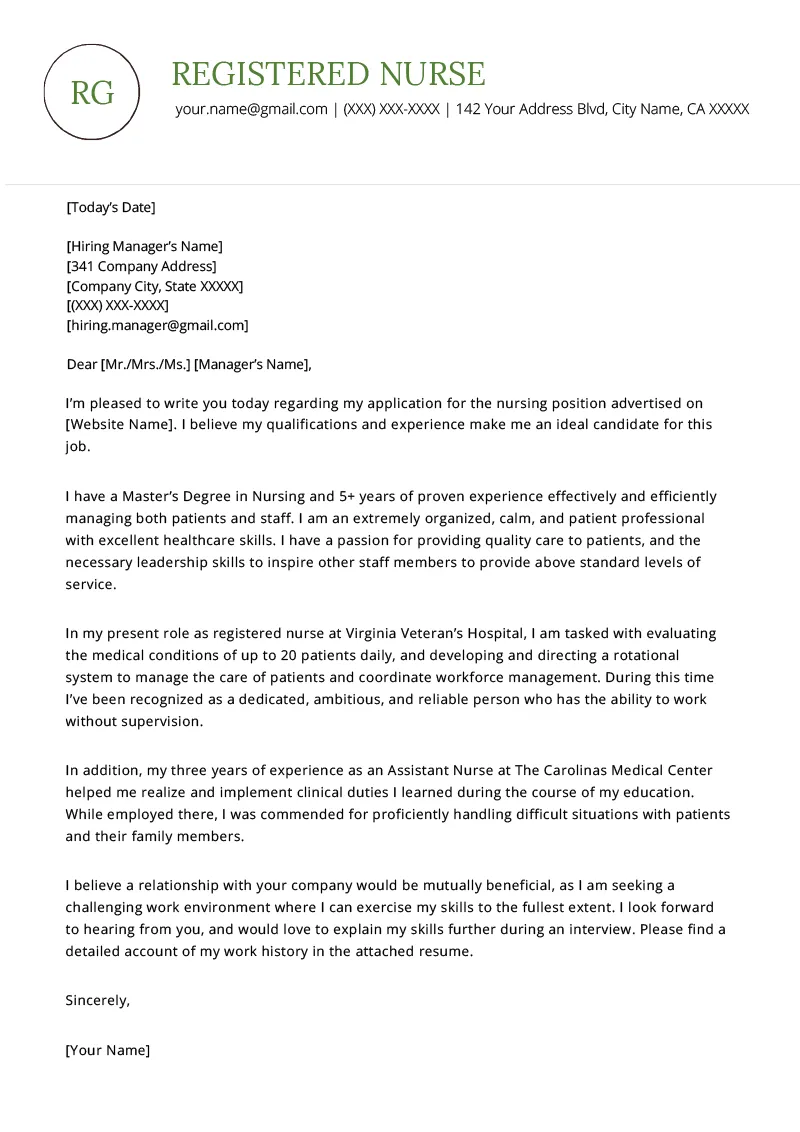
Reviewing examples of strong nursing cover letters can provide valuable insights and inspiration for writing your own. Analyze how the candidates highlight their skills, quantify their achievements, and express their enthusiasm. These examples showcase the impact of different approaches and provide a foundation for crafting your own compelling cover letter. Remember to tailor any example to your specific skills, experience, and the job requirements.
Cover Letter Example 1
This is a basic example. Dear [Hiring Manager name], I am writing to express my interest in the Registered Nurse position at [Hospital name], as advertised on [Platform name]. With five years of experience in critical care, I have a strong track record of providing exceptional patient care and working effectively within a team. During my time at [Previous Hospital name], I consistently received positive feedback from patients and colleagues. I am particularly drawn to [Hospital name]’s commitment to [Hospital’s mission] and believe my skills and passion align perfectly with your values. I am confident that I can make a significant contribution to your team. I am excited at the prospect of joining your dedicated team. Thank you for your time and consideration. I look forward to hearing from you soon.
Cover Letter Example 2
This is another basic example. Dear [Hiring Manager name], I am writing to apply for the Nurse Practitioner position at [Clinic name]. I am an experienced Nurse Practitioner with a strong background in family medicine, seeking to join a team that values compassionate care. My experience includes the diagnosis and treatment of a wide range of health conditions and I am committed to providing patient-centered care. I am drawn to [Clinic name]’s commitment to [Clinic’s values] and believe that my skills and experience align seamlessly with your mission. My clinical proficiency and passion for holistic patient care make me an ideal candidate. Thank you for your consideration. I look forward to the opportunity to discuss my qualifications further.
Common Mistakes to Avoid
Even minor mistakes can undermine the impact of your nursing cover letter. Be aware of common pitfalls to ensure your application makes a positive impression. Careful attention to detail and a professional approach are crucial for success.
Generic Cover Letters
Sending a generic cover letter to multiple employers is a common mistake. These letters lack the personalization needed to make a strong impression. Tailor your letter to each job application, highlighting your interest in the specific role and demonstrating your knowledge of the healthcare facility. Generic cover letters indicate a lack of genuine interest, and may lead the hiring manager to believe that you lack attention to detail.
Typos and Grammatical Errors
Typos and grammatical errors can damage your credibility and professionalism. Proofread your cover letter meticulously, and consider asking a friend or family member to review it. Pay attention to spelling, grammar, and punctuation. Ensure that your language is clear, concise, and professional. A polished and error-free cover letter demonstrates that you care about the details.
Overstating Qualifications
Avoid overstating your qualifications or making false claims about your experience. Be honest and accurate in representing your skills and experience. Exaggerated claims can be easily uncovered during the interview process and can damage your credibility. Focus on your actual achievements and how they align with the job requirements. Honesty is the best policy when it comes to representing yourself in a cover letter.
Conclusion
A well-written nursing cover letter is an essential tool for landing your desired job. By understanding its purpose, incorporating key components, and avoiding common mistakes, you can create a compelling cover letter that showcases your qualifications and enthusiasm. Remember to tailor your cover letter to each job application, and always proofread carefully. With a thoughtful and professional approach, you can significantly increase your chances of getting hired and advancing your career in nursing. Good luck with your job search!
